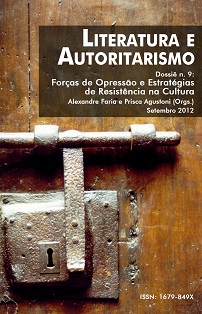Forgetting, silencing or sharing trauma: some experiences of traumatic memory in contemporary culture
DOI:
https://doi.org/10.5902/1679849X75303Keywords:
Traumatic memory, Forgetfulness, RemembranceAbstract
The last decades of the twentieth century, a period of intense disruptions and strong acceleration of the lived experience of time, seen the emergence of memory, and later, its obsession. Questioning what are the memories of that century, one can highlight the traumatic experiences through wars, massacres and genocide. Thus, the article seeks to address certain experiences of traumatic memories as a basis initially adopting the Second World War, an event that generated memories for many people banned, blocked, forgotten and / or silenced, as the former Nazi victims and survivors, especially those of concentration camps. It also aims to outline thoughts about the traumatic memories of mourning the death of a loved one, emphasizing especially the survivors of the massacre of the Italian town Civitella Val di Chiana and the mourners who share their grief in the pages of the Internet, as sites cemeteries online and social network Orkut.
Downloads
References
ALBUQUERQUE, Afonso de. Viver e morrer no Orkut: os paradoxos da rematerialização do ciberespaço. Intexto, Porto Alegre, julho/dezembro 2007. UFRGS, v. 2, n. 17, p. 1-17. Disponível em: <http://seer.ufrgs.br/index.php/intexto/article/viewFile/4229/4136>. Acesso em: 24 nov. 2011.
ARIÈS, Philippe. História da morte no Ocidente. Rio de Janeiro: Ediouro, 2003.
BARBOSA, Aline da Silva Néto. Orkut: o espaço que possibilita a Visibilidade e a Imortalidade. In: Congresso Brasileiro de Ciências da Comunicação, 32., 2009, Curitiba Anais eletrônicos... Curitiba: 2009. Disponível em:
<http://www.intercom.org.br/premios/2009/AlineBarbosa.pdf>. Acesso em: 29 nov. 2011.
GAGNEBIN, Jeanne Marie. “Memória, História e Testemunho”. In BRESCIANI, Stella & NAXARA, Márcia (org.) Memória e (res)sentimento. Indagações sobre uma questão sensível. Campinas: Ed. Unicamp, 2004. p. 85-94.
HARTOG, François. “Regimes de Historicidade”. International Review of Social History, 38, 1993. Disponível em:
<http://www.fflch.usp.br/dh/heros/excerpta/hartog/hartog.html>. Acesso em 24 nov. 2011.
HARTOG, François. “Tempo e Patrimônio”. Varia História, Belo Horizonte, v. 22, nº 36: p.261-273, Jul/Dez 2006. Disponível em:
<http://www.scielo.br/pdf/vh/v22n36/v22n36a02.pdf>. Acesso em 10 dez. 2011.
HUYSSEN Andreas. Passados presentes: mídia, política, amnésia. In: Seduzidos pela Memória. Rio de Janeiro: Aeroplano, Universidade Cândido Mendes, Museu de Arte Moderna do Rio de Janeiro, 2000.
Luto na internet: web tornou-se ambiente para discutir a morte. Diário Catarinense, Santa Catarina, 22 ago. 2010. Biblioteca Pública do Estado de Santa Catarina (BPESC).
MENESES, Ulpiano T. B. de. Cultura política e lugares de memória. In: Azevedo, Cecília et al. (orgs.). Cultura política, memória e historiografia. Rio de Janeiro: Ed. FGV, 2009. p. 445-463.
MIRANDA, Waina Ferreira. Práticas de aconselhamento para adultos enlutados: A importância da relação de ajuda na superação da dor da perda. 2010. 57 p. Monografia (Pós Graduação em Aconselhamento) - Faculdade Teológica Batista de São Paulo. São Paulo, 2010.
MUDROVCIC, María Inés. Por que Clio retornou a Mnemosine? In: Azevedo, Cecília et al. (orgs.). Cultura política, memória e historiografia. Rio de Janeiro: Ed. FGV, 2009. p. 101-116.
NORA, Pierre. Entre memória e história. A problemática dos lugares. Projeto História, São Paulo, n. 10, p. 7-28, dez. 1993.
PARKES, Colin Murray. Luto: estudos sobre a perda na vida adulta. São Paulo: Summus, 1998.
POLLAK, Michael. L'expérience concentrationnaire: essai sur le maintien de 1'identité sociale. Paris: Éditions Metailié, 1990.
POLLAK, Michael. “Memória, Esquecimento, Silêncio”. Estudos Históricos, Rio de Janeiro, v.2, n. 3, 1989.
PORTELLI, Alessandro. O massacre de Civitella Val di Chiana (Toscana: 29 de junho de 1944): mito, política, luto e senso comum. In: AMADO, Janaina e FERREIRA, Marieta de Moraes. (Coord.) Usos & Abusos da História Oral. 8ª ed. Rio de Janeiro: Editora FGV, 2006, p.103-130.
SALES, Talita. ORKUT: Há Vida após a morte. Matina, 1dez. 2008. Disponível em: <http://matinauniao.blogspot.com/2008/12/orkut-h-vida-aps-morte.html>. Acesso em: 15 dez. 2011.
SARLO, Beatriz. Paisagens imaginárias: Intelectuais, arte e meios de comunicação. São Paulo: USP, 1997.
VIANNA, Glaucia Regina. “Narradores melancólicos: literatura testemunhal e a construção de uma memória”. Morpheus - Revista Eletrônica em Ciências Humanas, v. 8, n. 13, 2008. Disponível em: <http://www.unirio.br/morpheusonline/numero13-2008/glauciavianna.htm>. Acesso em: 21 nov. 2011.
Downloads
Published
How to Cite
Issue
Section
License
DECLARAÇÃO DE ORIGINALIDADE E EXCLUSIVIDADE E CESSÃO DE DIREITOS AUTORAIS
Declaro que o presente artigo é original e não foi submetido à publicação em qualquer outro periódico nacional ou internacional, quer seja em parte ou na íntegra. Declaro, ainda, que após publicado pela Literatura e Autoritarismo, ele jamais será submetido a outro periódico. Também tenho ciência que a submissão dos originais à Literatura e Autoritarismo implica transferência dos direitos autorais da publicação digital. A não observância desse compromisso submeterá o infrator a sanções e penas previstas na Lei de Proteção de Direitos Autorais (nº 9610, de 19/02/98).






